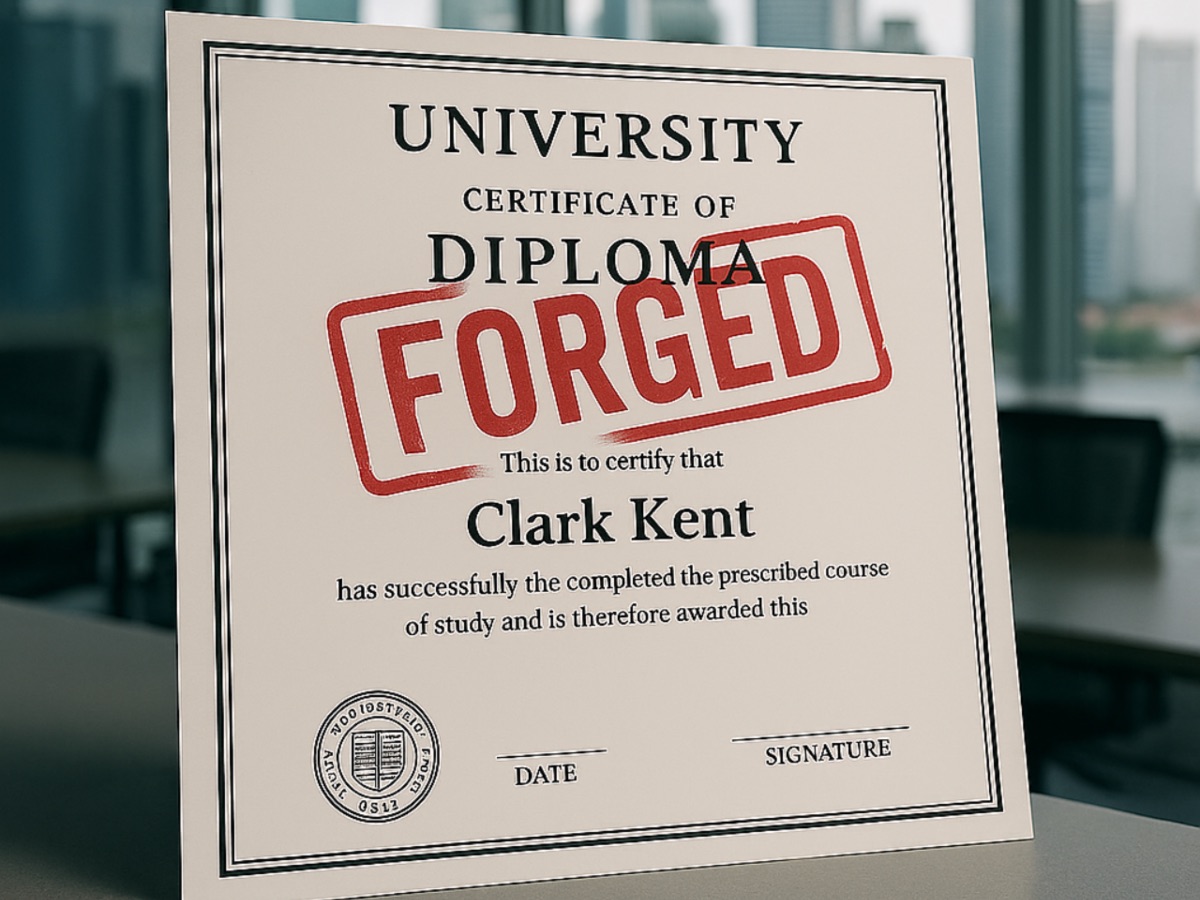We rely on credentials and qualifications, especially when hiring across international borders. This trust is the backbone of a fair and functional global workforce. However, a recent and revealing case from Singapore shows just how fragile that trust can be. The case involves two individuals, a series of sophisticated forged documents, and a deliberate scheme to deceive the system governing Employment Passes.
This story is more than just about a couple of fake papers. It peels back the layers of international hiring and exposes significant vulnerabilities. For a global hub like Singapore, the integrity of its employment system is paramount. The Controller of Work Passes relies completely on accurate declarations and genuine qualifications to manage the labour market fairly. When false information enters the system, it doesn’t just bend the rules; it breaks the very foundation of trust. Let’s dive into the specifics of this case and explore what it tells us about the challenge of upholding integrity.
The Anatomy of a Deception: Forged Degrees and False Salaries
The core of this incident involves two women from the Philippines, Conal O’Meara Joy Torres and Torres Alyssa Riva Fernand, both 29. Singaporean courts recently sentenced them to jail for submitting forged university certificates with their Employment Pass (EP) applications. These passes are the essential legal gateway for foreign professionals to work in Singapore. Authorities use an applicant’s stated qualifications and salary to determine their eligibility. Therefore, submitting false information fundamentally undermines the entire evaluation process, making it incredibly difficult for officials to ensure fair play for all applicants.
Elmira’s case provides a clear example of this deception. In September 2020, an agent in the Philippines known as “Corey” found her a job as an assistant sales manager at CL Enterprise, a company that operates the Mr. Fix retail stores. Corey informed her the actual monthly salary would be $2,200. However, the trouble began when Elmira submitted a forged degree from Ateneo de Manila University, an institution she never attended. Following this, she signed an official declaration form for her EP application stating a fixed monthly salary of $7,800, a figure she knew to be false.
A Calculated Lie to Game the System
The salary discrepancy is a critical element of this fraud. A declared monthly salary of $7,800 is a massive jump from the actual $2,200 she was told she would receive. This wasn’t a minor error; it was a calculated move. The declared salary is a major factor in EP eligibility, with specific thresholds that applicants must meet. The Ministry of Manpower (MOM) confirmed that if the authorities had known her real salary was only $2,200, they would not have issued the pass because it failed to meet the necessary criteria. Elmira actively declared this much higher figure to game the system.
Based on these false declarations, her pass was approved. She then worked at the company for 15 months, from November 2020 to February 2022, performing duties like stock-taking and sales. Each month, she received her actual salary of $2,200 in cash. For her actions, Elmira received a sentence of six weeks in jail. The court also considered two other charges during sentencing: one for the inflated salary declaration and another for submitting a forged certificate for a previous job application, suggesting a potential pattern of deceit.
Uncovered by Chance: A Crack in the Verification Armour?
Elmira’s cousin, Alyssa, was also involved. Elmira introduced her to the same agent, who offered her a role as an assistant operations manager at the same company. In a detail that highlights the vulnerability of applicants, Alyssa had to pay the agent $4,500—a sum she took out a loan to cover—before the process even started. Like her cousin, she submitted a forged degree, this time from De La Salle University, and her pass was subsequently issued. She worked for 15 months earning an actual salary of $2,160 and received a sentence of four weeks in jail for her offence.
Perhaps the most revealing aspect of this case is how authorities uncovered the fraud. In February 2022, the Ministry of Manpower began investigating the women after receiving information about potential violations. However, the prosecution made a fascinating point in court. They stated that these false declarations would likely have gone undetected if not for a random inspection conducted on their employer, CL Enterprise. This detail is concerning. It suggests the initial application screening did not catch the sophisticated forgeries, implying that the perpetrators could have gotten away with it if not for a chance inspection.
Upholding Integrity in a Global Workforce
This case highlights the immense challenge authorities face. The prosecution pushed for higher sentences, arguing that this type of fraud is incredibly difficult to detect. Furthermore, they correctly asserted that by taking jobs based on lies, the women deprived genuinely qualified individuals of those opportunities. The potential penalties for such an offence in Singapore are severe—up to two years in jail and a $20,000 fine—reflecting the gravity of the crime. The case serves as a stark reminder of the absolute importance of integrity in all official and professional documentation.
It forces us to ask difficult questions about the resilience of our systems. If sophisticated schemes can bypass initial checks and rely on later, sometimes random, enforcement, what does that mean for fairness in global talent mobility? As countries compete for talent, they face a constant balancing act. They must facilitate the movement of skilled professionals while also implementing rigorous verification to protect their labour markets from fraud. This case from Singapore demonstrates that even with robust systems in place, the pursuit of integrity is an ongoing and relentless challenge.
If you like to submit a question, or would like us to touch on certain topics, you may email us at [email protected]. When in doubt, seek legal advice or consult an experienced licensed Employment Agency with the Ministry of Manpower.
Yours Sincerely,
The editorial team at Singapore Employment Agency
Little Big Employment Agency Pte. Ltd. is a licensed Employment Agency with the Ministry of Manpower with license number 19C9790.

